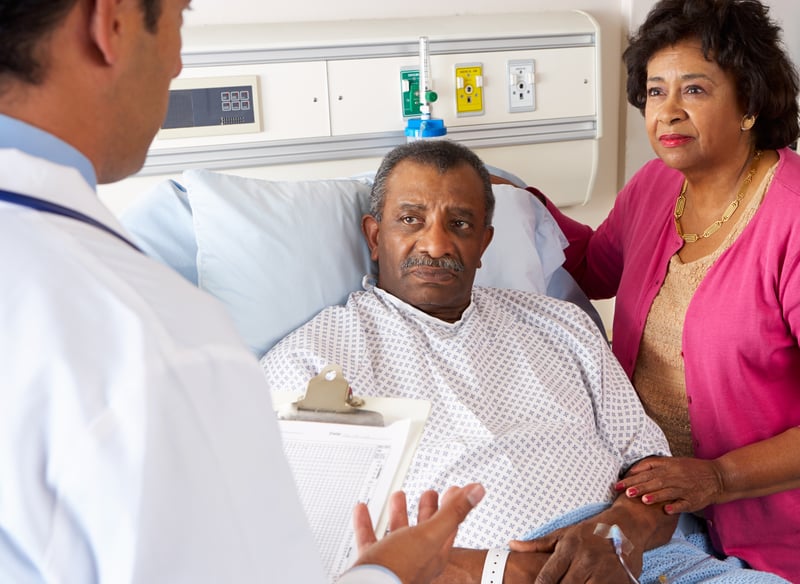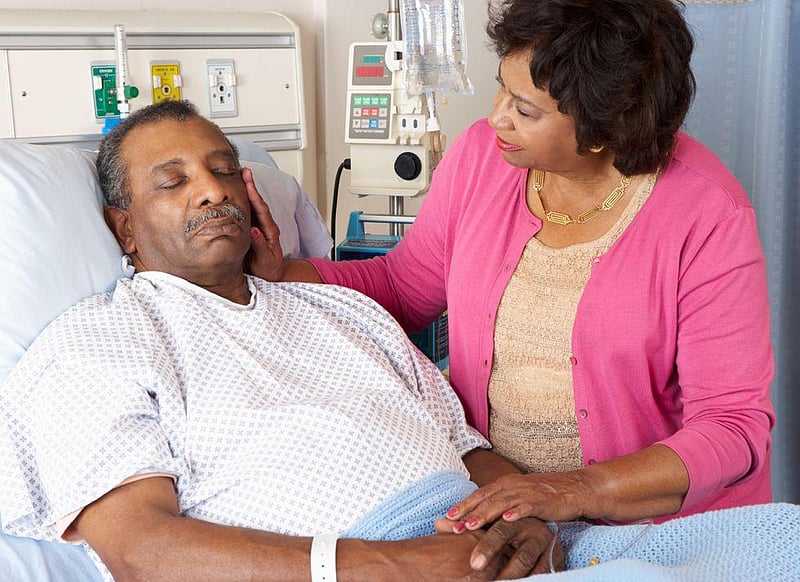Get Healthy!
Results for search "Prostate Problems".
Health News Results - 22
Former President Joe Biden is now receiving radiation and hormone therapy to treat an aggressive form of prostate cancer, his office confirmed Saturday.
“As part of a treatment plan for prostate cancer, President Biden is currently undergoing radiation therapy and hormone treatment,”
- I. Edwards HealthDay Reporter
- |
- October 14, 2025
- |
- Full Page
Prostate cancer rates are climbing in the U.S. with more men being diagnosed at later stages when the disease is harder to treat, researchers report.
The analysis — published Tuesday in the journal CA: A Cancer...
- I. Edwards HealthDay Reporter
- |
- September 4, 2025
- |
- Full Page
Longtime ESPN “SportsCenter” anchor Jay Harris has been diagnosed with prostate cancer and is scheduled to have surgery on June 10.
Harris, 60, wrote about his experience in an essay posted June 5 on ESPN’s Front Row w...
- HealthDay Reporter
- I. Edwards
- |
- June 6, 2025
- |
- Full Page
Former President Joe Biden's prostate cancer diagnosis has drawn attention to screening guidelines for older men.
When Biden, 82, was diagnosed last week, his cancer had already spread to his bones. His last prostate screening was more than a decade ago.
“President Biden’s last...
- HealthDay Reporter
- I. Edwards
- |
- May 23, 2025
- |
- Full Page
Former President Joe Biden has been diagnosed with advanced prostate cancer that has spread to his bones, his office announced Sunday.
Doctors found the cancer after Biden reported urinary symptoms. Testing showed a small nodule on his prostate. ...
- HealthDay Reporter
- I. Edwards
- |
- May 19, 2025
- |
- Full Page
“An ounce of prevention is worth a pound of cure,” founding father Benjamin Franklin once said.
That’s definitely true of cancer, a new study has found.
Cancer prevention and screening has saved more people from five types of cancer during the past 45 years than advances in tr...
- HealthDay Reporter
- Dennis Thompson
- |
- December 5, 2024
- |
- Full Page
Prostate medications might help reduce the risk of a specific type of dementia, a new study suggests.
People were less likely to develop Lewy body dementia when taking drugs designed to treat urinary symptoms caused by an enlarged prostate, researchers reported June 19 in the journal Neurology.
...- HealthDay Reporter
- Dennis Thompson
- |
- June 20, 2024
- |
- Full Page
Precisely delivered ultrasound could be an effective treatment for prostate cancer, with high-frequency sound waves heating and killing off cancer cells, a new study says.
The treatment killed off all prostate cancer cells in 76% of men who underwent a follow-up biopsy one year la...
- HealthDay Reporter
- Dennis Thompson and Carole Tanzer Miller
- |
- March 20, 2024
- |
- Full Page
Follow-up from recent surgery for an enlarged prostate has revealed that Britain's King Charles III has cancer, Buckingham Palace announced Monday.
The palace did not disclose the type of cancer that was discovered.
"During The King's recent hospital procedure for benign prostate enlargement, a separate issue of concern was noted," the palace said in a
Britain's King Charles III is expected undergo surgery next week to correct an enlarged prostate, and experts say these procedures are common in older men and safe.
The king, 75, has what's clinically known as benign prostatic hyperplasia (BPH).
"An enlarged prostate means the gland has grown bigger. Prostate enlargement happens to almost all men as they get older," noted
A technique that uses imaging technology as a guide can make radiation therapy safer for patients undergoing treatment for prostate cancer, a new research review finds.
The technology enables clinicians to accurately aim the radiation beams at the prostate, while avoiding bladder, urethra and rectal tissue. This, in turn, reduces short-term side effects for patients, according to research...
- HealthDay Reporter
- Cara Murez
- |
- July 25, 2023
- |
- Full Page
The most common screening test for prostate cancer so often returns a false positive result that it's no longer recommended for men older than 70, and it's offered as a personal choice for younger men.
But researchers think they've found a way to make the blood test for prostate-specific antigen (PSA) accurate enough to significantly reduce overdiagnosis and better predict dangerous cance...
- HealthDay Reporter
- Dennis Thompson
- |
- June 5, 2023
- |
- Full Page
When most men think about their prostate, it's to worry about whether they have prostate cancer or not. But another condition is far more common and plenty painful.
Prostatitis involves inflammation of the prostate gland and sometimes the areas around it. Not only is prostatitis highly treatable, but it is highly prevalent among men. According to the Prostate Cancer Foundation, it is the ...
- HealthDay Reporter
- Ann Schreiber
- |
- May 31, 2023
- |
- Full Page
You're due for a prostate exam, but you don't know what to expect.
So, what is this exam like?
Regular check-ups are essential for maintaining your health, and a prostate exam is crucial to preventive care for men. Not only is it a screening test for early signs of prostate cancer, but it also helps detect other potential health issues.
Here, experts walk you ...
- HealthDay Reporter
- Ann Schreiber
- |
- May 31, 2023
- |
- Full Page
Over the last decade, more and more Americans with early-stage prostate cancer have put off radiation and surgery, the standard treatment options, new research indicates.
Instead, many U.S. men with low- or intermediate-risk prostate cancer have embraced "active surveillance,"in which their disease is carefully monitored for any sign of progression that might eventually require inter...
- HealthDay Reporter
- Alan Mozes
- |
- April 4, 2023
- |
- Full Page
Researchers have identified five types of bacteria associated with aggressive prostate cancer, and they say their findings could lead to new treatments for the disease.
The five types of bacteria were common in urine and tissue samples from men with aggressive prostate cancer, according to the team at the University of East Anglia (UEA) in the United Kingdom.
All of the bacteria ar...
- HealthDay Reporter
- Robert Preidt
- |
- April 21, 2022
- |
- Full Page
A new analysis uncovers a racial paradox in prostate cancer care: While Black men are often diagnosed later and with more aggressive disease than white men, radiation therapy seems to work better for them than for their white peers.
To come to that conclusion, researchers reviewed seven trials comprising more than 8,800 men with
Black, Hispanic and Asian men in the United States are less likely than white men to receive a follow-up MRI after a screening suggests prostate cancer, a new study finds.
"We can't say definitively if the reason Black, Hispanic, and Asian men did not receive this particular test is that physicians did not refer them for it, or if the patients opted themselves out of further testing," sai...
- HealthDay Reporter
- Robert Preidt
- |
- November 10, 2021
- |
- Full Page
A urine test might one day be able to tell which prostate cancer patients need immediate treatment and which don't, British researchers report.
"Prostate cancer can be divided into low and high risk -- the low-risk men rarely require treatment, and the high-risk certainly do," said study author Jeremy Clark, a senior research associate at Norwich Medical School at the University of E...
- HealthDay Reporter
- Steven Reinberg
- |
- November 4, 2021
- |
- Full Page
Does having an enlarged prostate doom you to prostate cancer?
Far from it, a new study suggests.
Also called benign prostatic hyperplasia (BPH), the condition may actually provide some protection for men from developing prostate cancer, researchers report.
"Men are often anxious about prostate cancer, as it is the second most common cancer in men, with some worrying BPH increa...
- HealthDay Reporter
- Steven Reinberg
- |
- August 25, 2021
- |
- Full Page
Men with chronic pain from prostate inflammation may get lasting relief from acupuncture, a new clinical trial finds.
At issue is a condition known as chronic prostatitis/chronic pelvic pain syndrome, in which the prostate gland becomes inflamed and nerves supplying the area are irritated. That can cause pain in the perineum, penis, scrotum and low belly, as well as urinary problems and s...
- HealthDay Reporter
- Amy Norton
- |
- August 20, 2021
- |
- Full Page
Widowers have a higher risk for advanced prostate cancer than men who are part of a couple, Canadian researchers say.
The new findings are from an analysis of 12 studies comparing 14,000 men newly diagnosed with prostate cancer and 12,000 healthy men.
The study -- recently published in the European Journal of Epidemiology -- suggests that social environment is an important ...
- HealthDay Reporter
- Robert Preidt
- |
- August 13, 2021
- |
- Full Page

























